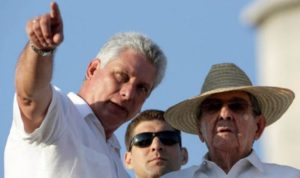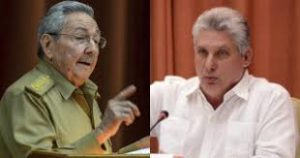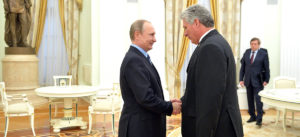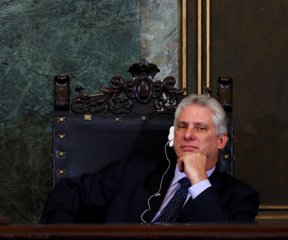 (OPINION) CHALLENGE FOR A NEW PRESIDENT OF CUBA: ECONOMY OR IDEOLOGY?
(OPINION) CHALLENGE FOR A NEW PRESIDENT OF CUBA: ECONOMY OR IDEOLOGY?
The meeting for the constitution of the new Parliament, the last step of the process that will culminate with the relay of Raúl Castro to the presidency, will begin today Wednesday April 18, a day earlier than initially expected, the official media of the Island reported Monday. according to this, to “facilitate the development of the steps required by a session of such importance”.
Today Cuba’s National Assembly cleared the way for the end of Castro rule this Wednesday, naming handpicked successor Miguel Diaz-Canel as the sole candidate for head of state.
The now successor of the Castro inherits a complicated scenario, with economic crises worsened by the crisis in Venezuela, internal management errors, the failed thaw with the US and a frozen confrontation with the Organization of American States (OAS), worsened after the arrival of conservative governments to the main countries of the region.
The “old mentality” of Cuba, according to international analysts, means assuming that ideological and governmental alliances will bring economic benefits. “That has not happened,” said Cuban analyst J. Alzugaray, who cited the close political relations with China, which have not meant “big investments” by the Asian giant in Cuba, where its presence is almost anecdotal compared to other Latin American countries. . Alzugaray recalled that the slowness of the Government’s economic reforms and the paralysis of the private sector are signs “that the markets receive that things are going very slowly here”.
For the professor of the University of Texas Arturo López Levy, Cuba’s future foreign policy will be continuist “given that it faces an international context that does not change and the programmatic bases of Cuba’s foreign policy dictated by the interests and values of Cuba are retained. Communist Party “. In this context, the relationship and “resistance” to the United States continues to be essential, “which has had and will have priority in the attention of any ruling team as long as the embargo is maintained,” he said.
The arrival of Donald Trump to the White House turned the tide of the thaw and in the short term it does not seem that things are going to improve, nor that the relation with Cuba is a priority of the foreign policy of the republican leader. Beyond the neighbor from the north, for López Levy “it is expected that, as a balance to the difficult relationship with Washington, Cuba will continue to seek special relations with the great rival powers China and Russia”.
The renewed interest of Russia for its “partner” of yesteryear, rekindled by the now stagnant rapprochement between the island and the US, and, although it is unlikely that Moscow will support Havana without compensation, is “today” for Russia, a symbol of extra-continental projection and status, “says the expert.
With Europe a new scenario opens up after the recent signing of the first treaty between Cuba and the EU bloc, which puts an end to the limiting “common position” that for two decades made political dialogue dependent on advances in human rights. Precisely with the European Union, and also with Canada and Japan, “there are important potentials for a more fluid relationship if economic reform takes off,” says López Levy.
As for Latin America and Africa, “these are scenarios in which Cuba enjoys an important capital of goodwill with modest but significant amounts” despite the reduction since 1989 of the export of professional services to these areas.
The reapproximation of Raúl Castro to America has gone through a firm commitment to the Community of Latin American and Caribbean States (Celac), in contrast to his coldness towards the OAS, from which Cuba was suspended shortly after the Revolution triumphed. Cuba does not consider a quick return to the OAS.
 (OPINIÓN) RETO PARA UN NUEVO PRESIDENTE DE CUBA: ECONOMÍA O IDEOLOGÍA?
(OPINIÓN) RETO PARA UN NUEVO PRESIDENTE DE CUBA: ECONOMÍA O IDEOLOGÍA?
La reunión para la constitución del nuevo Parlamento, el último paso del proceso que culminará con el relevo de Raúl Castro a la presidencia, comenzará hoy miércoles 18 de abril, un día antes de lo inicialmente previsto, en los medios oficiales de comunicación. la isla informó el lunes. según esto, para “facilitar el desarrollo de los pasos requeridos por una sesión de tal importancia”.
También hoy, la Asamblea Nacional de Cuba allanó el camino para el fin del gobierno de Castro este miércoles, y nombró al sucesor elegido a dedo, Miguel Díaz-Canel, como el único candidato a la jefatura de Estado.
El ahora sucesor de los Castro hereda un escenario complicado, con apreturas económicas empeoradas por la crisis en Venezuela, los errores internos de gestión, el fallido deshielo con EE.UU y un enquistado enfrentamiento con la Organización de Estados Americanos (OEA), empeorado tras la llegada de gobiernos conservadores a los principales países de la región.
La “vieja mentalidad” cubana, según analistas internacionales, suponen dar por hecho que las alianzas ideológicas y gubernamentales traerán consigo frutos económicos. “Eso no ha pasado”, afirmó el analista cubano J.Alzugaray, quien citó las estrechas relaciones políticas con China, que no han supuesto “grandes inversiones” del gigante asiático en Cuba, donde su presencia es casi anecdótica en comparación con otros países latinoamericanos. Alzugaray recordó que la lentitud de las reformas económicas del Gobierno y la paralización del sector privado son señales “que reciben los mercados de que aquí las cosas marchan muy lentamente”.
Para el catedrático de la Universidad de Texas Arturo López Levy, la futura política exterior cubana será continuista “dado que se enfrenta a un contexto internacional que no cambia y se retienen las bases programáticas de la política exterior de Cuba dictada por los intereses y valores del Partido Comunista”. En ese contexto, sigue siendo esencial la relación y “resistencia” hacia EE.UU, “que ha tenido y tendrá la prioridad en la atención de cualquier equipo gobernante en tanto el embargo se mantenga”, considera.
La llegada de Donald Trump a la Casa Blanca torcieron el rumbo del deshielo y a corto plazo no parece que las cosas vayan a mejorar, ni que la relación con Cuba sea una prioridad de la política exterior del líder republicano. Más allá del vecino del norte, para López Levy “es de esperar que, como balance a la difícil relación con Washington, Cuba siga buscando relaciones especiales con las grandes potencias rivales China y Rusia”.
Es patente el renovado interés de Rusia por su “socio” de antaño, reavivado por el ahora estancado acercamiento entre la isla y EE.UU, y, aunque es improbable que Moscú vaya a respaldar a La Habana sin contraprestaciones, esa relación “es hoy para Rusia un símbolo de proyección extra continental y estatus”, sostiene el experto.
Con Europa se abre un nuevo escenario tras la reciente firma del primer tratado entre Cuba y el bloque comunitario, que pone fin a la limitante “posición común” que durante dos décadas supeditó el diálogo político a los avances en derechos humanos. Precisamente con la Unión Europea, y también con Canadá y Japón, “existen importantes potenciales para una relación más fluida si la reforma económica toma vuelo”, opina López Levy.
En cuanto a América Latina y África, “son escenarios en los que Cuba disfruta de un capital importante de buena voluntad con cantidades modestas pero significativas” pese a la reducción desde 1989 de la exportación de servicios profesionales a esas zonas.
La reaproximación de Raúl Castro a América ha pasado por una firme apuesta por la Comunidad de Estados Latinoamericanos y Caribeños (Celac), en contraste con su frialdad hacia la OEA, de la que Cuba fue suspendida poco después de triunfar la Revolución. Cuba no se plantea un pronto retorno a la OEA.
Agencies/EFE/Opinion/Excerpts/Internet Photos/Arnoldo Varona/TheCubanHistory.com
THE CUBAN HISTORY, HOLLYWOOD.






